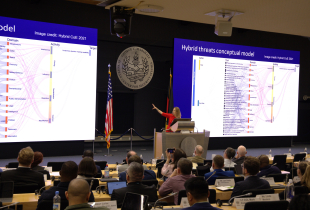
Marshall Center Professors Conduct Cyber Security Workshop in Uzbekistan
By Darren Adams
George C. Marshall European Center for Security Studies
TASHKENTT, Uzbekistan (July 6, 2015) -- In partnership with the Office of Military Cooperation at the U.S. Embassy Tashkent, a team of cyber professionals from the George C. Marshall European Center for Security Studies traveled to Tashkent June 29 and 30 to conduct the first Marshall Center-Uzbekistan bilateral workshop on cyber security.
This event consisted of an interagency group of more than 40 Uzbek officials representing the President’s Security Council, Ministry of Defense, Ministry of Interior, Ministry of Information, Ministry of Foreign Affairs, Information Security Maintenance Center, Institute of Strategic and Interregional Studies, and the Analytical Centre of International Cooperation and Security.
This Cyber Security Best Practices Workshop was designed to assist leaders in making informed decisions on the development of cyber implementation initiatives, legislation development, cyber enterprise planning, investigations, governmental oversight as well as strategy and policy management issues required to develop a secure cyber infrastructure. During the workshop, presentations were given by both Marshall Center experts and their Uzbek counterparts on the current Cyber Security challenges and open discussions focused on different approaches in dealing with these issues.
Phil Lark, director of the Marshall Center’s Program on Cyber Security Studies, summed up his impression on the first day as follows: “This workshop is excellent. The Uzbekistan government’s leadership and commitment to improving cyber security was clearly demonstrated in the workshop. More than 40 Uzbek participants from a variety of ministries and agencies actively contributed to increasing security, information sharing and best practices in cyber space. The Uzbek government’s comprehensive approach is notable. The Uzbek Electronic Government initiatives in improving on-line security for ordinary citizens, private enterprises and government are impressive.”
“This was an outstanding success,” said Marshall Center Adjunct Professor Joseph Vann at the conclusion of the event. Vann, who assisted with the workshop and provided a lecture on process approaches to developing a national Cyber Security Strategy, said it was one of the best events that he’s been involved in. “It was clear that we had a very informed group who represented the critical cyber elements of the Uzbek government. The level of attention and interest was notable but the truly impressive aspect was the exchange of ideas and comments shared among the different ministries. The concept of whole-of-government and interagency approaches were well received. It was also plain to see that the participants gained an appreciation for new methods to meet their challenges,” Mr. Vann added.
Vann also pointed out a few important factors that led to the achievements: “What really made this a success was the commitment by the senior Uzbek leadership to identify and send such a unique group of motivated and talented cyber security professionals. When you have this level of support from the Uzbek government, combined with the excellent support of the U.S. Embassy and OMC, success is easy.”
As mentioned above, this was the first event on Cyber Security the Marshall Center has conducted in Uzbekistan and if this event’s success is any indication, the groundwork has been laid to continue cooperation on these topics in FY16 and beyond.
